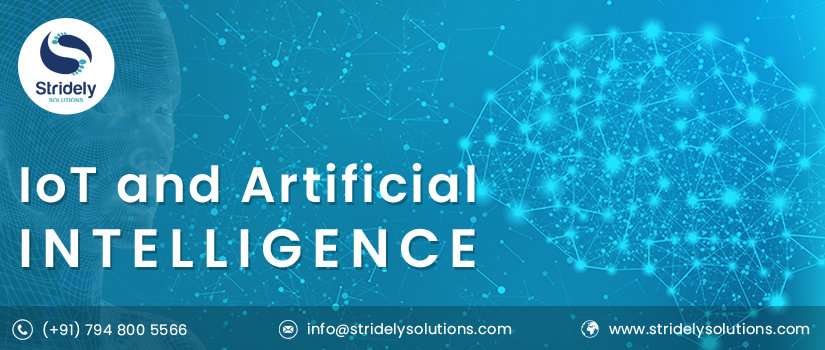Our daily lives today seem to be coming closer to a science fiction film which we all have grown up watching. Today you can talk to a smart phone and get answers to your questions, you can also let a virtual person know that is it right to do a particular thing or no. Sounds very much unreal, but this is today’s truth which we are all living in our daily lives. So here’s welcoming you all to the world of “Internet of Things” and “Artificial Things”.
Internet of Things (IoT) and Artificial Intelligence (AI) both are now picking up a lot of popularity in the world of technology. Hence it is having a lot of impact on our daily lives. IoT can be considered to be a treasure of a lot of data. It is not just simple any kind of data. Instead this data is something that would save your life by providing real stats to your healthcare provider, help in making your city cleaner by providing ways in which you can better manage waste in your surroundings, also bring about improvement among the employees across various sectors. Not to forget our very own homes where we have so many smart devices that control each appliance with just one command. So you can clearly see that there are endless possibilities when it comes to the touch of IoT. But for IoT to deliver all of its promises there is a need for an increase in speed as well as data accuracy. This particular thing can only be achieved with the introduction of Artificial Intelligence.
Today each business and every industry is trying to tap in the complete potential of IoT for creating newer product networks that would help in unlocking doors of opportunities for them. Hence we are witnessing lot of transformation on the way these companies are carry out their business and at the same time also engaging their customers actively. But to ensure that the business works smartly in today’s scenario, there is a need for IoT to combine along with Artificial Intelligence. Once they are both combined, your business can ensure a smart network so as to make more informed and productive decisions with little or no human help. In today’s ever changing business scenario and growth in competition the one and only way the business would be able to survive is by gaining customer loyalty and satisfaction. With the help of technology, there are various set of tools that would help in creating as well as maintaining the bond between the business and their customers.
Also Read: A Guide to ADSO Functions in SAP BW4HANA
Below are few ways how the business can incorporate both IoT and AI in making their business smarter and to also gain customer satisfaction:
-
Bringing about an increase in operational efficiency:
The AI technology is known to be able to generate precise as well as faster predictions. This would help the business to achieve much greater operational efficiency. The use of AI technology would provide the business with an insight into which of the tasks can be automated, which of the processes currently being run in the business are of not much use as well as time consuming. They also provide an insight on which of the current operational process would be better fine-tuned so as to achieve efficiency in the process.
-
Efficiency in Risk Management:
When AI is combined with IoT then it can offer the business various opportunities for better assessing, understanding as well as predicting risk on a timely manner. Both these mammoth technologies can in a way also help the business in automating their responses in a faster way for managing the safety of their works in a better manner and also reduce the possibility of any cyber threats leading to financial and reputation loss. There are a lot of banks which are making use of the AI technology. They have enabled a real-time identification for any kind of threats or suspicious transactions or activities through their connected surveillance cameras which are mostly installed in all of the ATMs.
-
Personalizing the customer experience:
In the earlier days and also for in certain cases today, in case of any grievance or complaints against any product, one has to personally reach out to the company. This would lead to lot of inconvenience for the customer and at the same time it would mean a lengthy process. Somewhere down the line the company had to lose out on its valued customer if proper after sales service was not provided. As per research, it has been said that around 10 years down the line, a major chunk of customer management service would be carried out without the need for any human interaction. It would be all done through a virtual interface. This can sound strange today since somewhere we are comparing personalized service to automated service. But the fact is that personalization of the customer experience is now becoming widely possible due to the introduction of technology as well as the big data analysis. It would mean, personalizing the marketing strategy to meet the customer’s needs, understanding the requirements of the customers before they even ask and raising the service standards for an unhappy customer.
-
New and improvement in the services and products:
When AI and IoT are coupled together then they surely promise to bring better as well as improved products or services. Let us take an example of GE. GE looked at Artificial Intelligence for automating the navigation of their inspection devices and at the same time to also identify any of the defects for their industrial inspection service. This led to tremendous reduction in the inspection cost for all of their clients and also made the service precise. Ultimately it led to better customer satisfaction.
-
Business Analysis process:
There is a growing need for finding out a proper balance in between supply and the demand. AI is said to help in better managing the inventory process and at the same time to also reduce the pressure on the stock since it would let you know in advance as to what you may be requiring and when. In a way it would help the retailers to avoid purchase of too many items only to later discover that they already have it in stock and now are unable to sell it leading to mounting cost. So you can call it efficiency than all of the manual practices that were done previously. On the other hand, manufacturers can also benefit by creating sensors which would be helpful in collecting as well as analyzing of the data related to the stock and the maintenance of machine.
-
Increase in automation:
Day by day there is more data to be processed. Due to this mounting pressure of the ever increasing Big Data, there is a need for automation. Automation would help in playing a bigger role for satisfying the needs of the customer when the right strategy is used. When things are done right in the first place, then it would help in making sense of the collection of real-time data. By carrying out the automation at the right places, it would help in sorting the business through, processing and also taking corrective action on the massive data that has been collected through surveys, customers and so on. Also in today’s busy paced lives, customers prefer to get their queries answered instantly, this is something that can be done through correct automation.
-
Employee trainings are getting easily accessible:
The virtual world is changing the game for the business people. This would mean not only for customer satisfaction or process efficiency; it also means employee satisfaction. AI coupled with IoT are changing the way, employees today are getting trained. This virtual change is enabling trainers to deliver their learning in a better and interactive manner even when the trainer is not physically present in the said location. Through the aid of learning tools, it is becoming easier for breaking down complex information for the employees and the students are able to retain that information. It is changing the way a trainer can train large number of people who are based in multiple locations remotely. This leads to reduction in training costs and easy access to learning.
-
Reduction in downtime costs:
In a factory when there are mounting orders that need to be completed, at such time any unplanned downtime of a machine can lead to huge losses for certain sectors such as manufacturing. Leveraging the predictive maintenance schedule for your equipment’s or machinery would help in managing any such unplanned downtimes. It would help save the business a lot of money and time. Further such industries can also reduce their costs of maintenance with the help of analytics capabilities wherein AI would help them in properly identifying any kind of irregularities.
The development in AI and other technologies is gradually shaping the world of business and how it operates. By harnessing the power of IoT and making innovative solutions would lead to customer satisfaction and at the same time also reduce the need for holding on to additional stock. Though it may seem as an exciting prospect but for some it may be scary. If used wisely and in a proper manner AI and IoT can change the way businesses are operating today and make it smarter.


